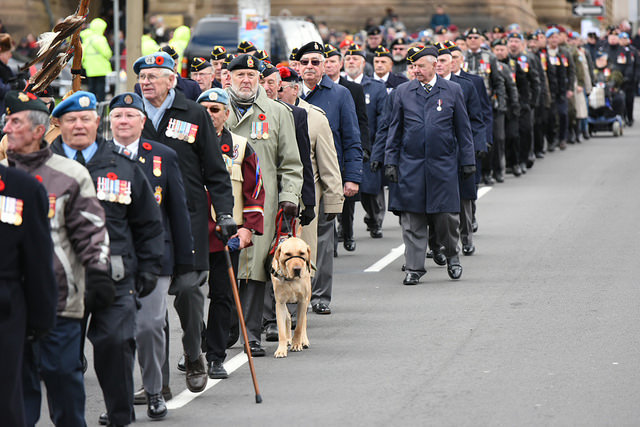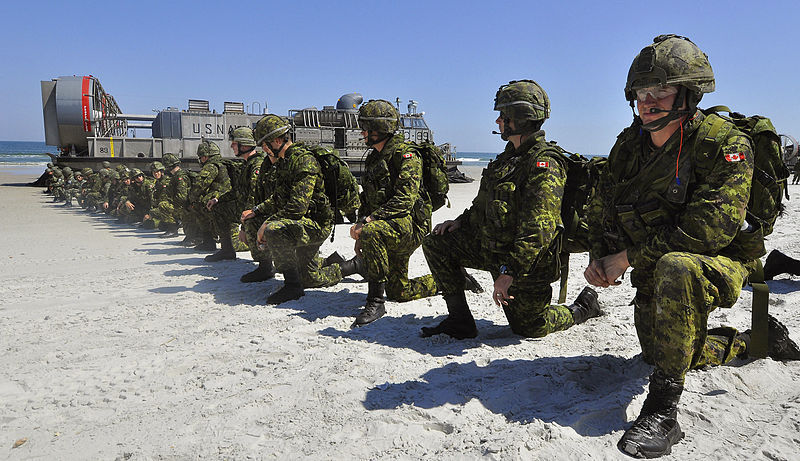The 2017 Federal Budget [PDF file] has postponed defence spending for military procurement by several years, but has committed significant benefits and services for Veterans and their families. The current government has committed to returning life-long pensions for injured Veterans, adding in the recent Budget that there will be an option for receiving the Disability Award as a monthly payment for life rather than as a one-time imbursement. The government has yet to act on this promise postponing the release of further details until the end of this year.
The 2016 Federal Budget [PDF file] outlined the investment of $5.6 billion over six years towards benefits and services for Veterans while also increasing the Disability Award to $360,000 in 2017. Additionally, the 2017 Budget outlines $624 million to be spent over multiple years towards programs, benefits and services that aid in the transition from military life to civilian life. This includes a Veterans’ Education and Training Benefit that covers four years of college, university, or technical education for Regular Forces and Reserve Forces personnel with at least six years of military service. The Budget also includes the investment of $187 million over six years to create the Caregiver Recognition Benefit which will give $1,000 per month directly to a Veteran’s caregiver providing them essential ongoing care.
Veterans Affairs offices that were closed by the previous government have been re-opened as promised in the 2016 Budget with the last few offices scheduled to be opened in May 2017. The recent Budget [PDF file] also outlined the creation of a Centre of Excellence on Post-Traumatic Stress Disorder (PTSD) and related mental health conditions, investing $17.5 million over four years to fund a centre dedicated to the “creation and dissemination of knowledge on prevention, assessment and treatment of PTSD and related mental health conditions.” These benefits and services outlined in the Budget demonstrate the fulfilment of many commitments promised to the Veteran community. However, what remains on the mind of many Veterans is how the current Canadian government will bring back the life-long pension they promised during the 2015 election.
An ongoing lawsuit brought against the Canadian government by the Equitas Society, involves six Veterans suing the government “over deficient compensation awarded under the New Veterans Charter,” demanding the same benefits that were received with the previous Pension Act before 2006. The Equitas Society argues that the pension option outlined in the recent Budget “does not come close to providing the standard of care and compensation that the previous Pension Act provided.”
Donald Sorochan, the lawyer representing the six Veterans claims “it’s all smoke and mirrors if they are just going to take the disability award and spread it out […] This budget doesn’t make the lawsuit go away […] Why was something good enough for Korean War Veterans not good enough for these guys?” The Veterans in this case argue that the current lump-sum payment results in them receiving less money over the course of a lifetime when compared to the pension system in place before 2006.
Further anger stems from the current government’s decision in response to the Equitas Society’s lawsuit, to adopt the previous government’s hard legal position that the federal authorities don’t have a “social contract” with Veterans. Government lawyers have argued that plaintiffs in the above case “seek to advance a purely economic interest” adding that a “scheme providing benefits cannot be said to amount to a deprivation merely because the claimant views the benefits as insufficient.” Sorochan calls this a “betrayal” as the current government has “turned its campaign promise into a lie.” The actual government ran on a platform that ensured “no veteran has to fight the government for the support and compensation they have earned,” and yet this change in the government’s legal stance demonstrates that Veterans are being forced to do just that.
Lee Berthiaume, a journalist with the Canadian Press, has written that this delay in releasing details towards how the government plans to fulfill its promise of re-establishing the life-long disability pension “sends a strong signal that the old pension system won’t be coming back.” Berthiaume warns that moving to “simply break up the disability award sets up a potential battle with those who counted on – and even campaigned for – the Liberals on the assumption that the government would return to the old system.”
If the current government does not follow through with their promises in the manner that was promised, then they will lose further support from the Veteran community. This is in addition to the trust that was lost by the double-dealing of the current government which campaigned for Veterans to not have to fight the federal authorities for the support they need, yet adopting the hard legal stance demonstrated above. What remains to be seen is what details are released at the end of the year towards how the government plans to return Veteran disability pensions back to the life-long pension system offered pre-2006 as promised. If the current government fails to fulfill this promise, many Veterans that voted them into power will be reluctant to make the same decision next election.
Photo: Veterans attend the Royal Canadian Legion service at the National War Memorial to mark Remembrance Day in Canada (2016) by Veterans Affairs Canada via Flickr. Licensed under CC BY-NC 2.0.
Disclaimer: Any views or opinions expressed in articles are solely those of the authors and do not necessarily represent the views of the NATO Association of Canada.




